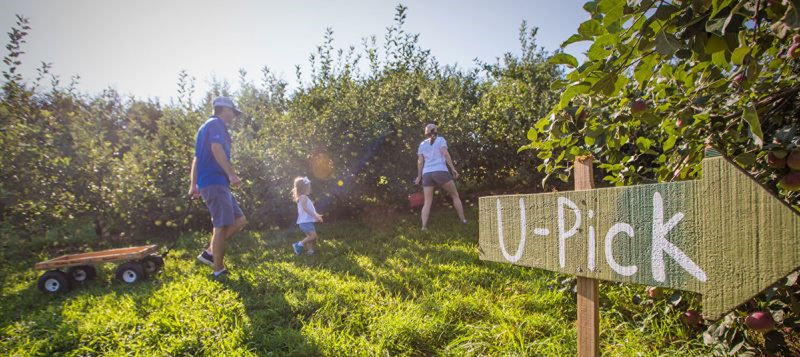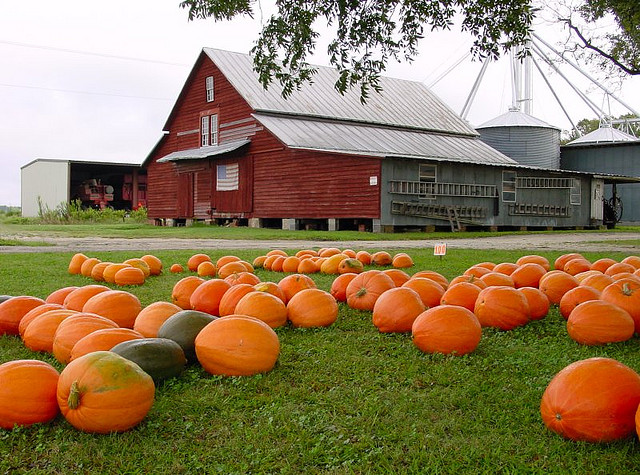
By Rochelle Sparko, CFSA Policy Director
In July 2017, Governor Cooper signed into law the Farm Act of 2017. With support from NCDA and Farm Bureau, Senate Bill 615 moved through the Senate and House with relative ease. One provision has captured the attention of small scale farms and beginning farmers. Section 8 of the Farm Act of 2017 restricts the ability of beginning farmers and small scale producers to engage in some types of agritourism on their farms.
In Section I, I take a look at the state of the law prior to July 2017. Section II describes the circumstances that led NCDA and Farm Bureau to engage in a concerted effort to change the law. In Section III, you will learn what’s changed as a result of the Farm Act of 2017. Finally, in Section IV, I offer farmers actions they can take if their farm enterprise is or will be adversely affected by the change in the law.
I. What WAS the law?
The state of North Carolina authorizes local government to enact zoning ordinances. See NC General Statute Section 153A-340. Zoning ordinances set some limits on how property owners may use their land. These ordinances cover property use issues ranging from how close construction can get to the property line, to what kinds of uses happen in particular areas to keep the heavy industrial activity separate from the community swimming pool. Zoning rules also require that people purchase permits in order to build on their property.
A number of years ago, North Carolina decided that farms would NOT be required to comply with zoning ordinances when constructing structures for use in farm operations. This makes it less expensive and less time consuming for a farmer to, say, build a barn for her cattle, a washing and packing shed for his vegetables, or a storage building for their tools.
The state law said that there were five ways that counties could determine whether a piece of land was a farm, and therefore could use the exemption from zoning law. (1) a farm sales tax exemption number issued by the NC Department of Revenue; (2) a copy of a property tax bill showing that the property was assessed using the present use value of the land; (3) a copy of the farmer owner or operator’s Schedule F IRS form from the most recent tax year; (4) a forest management plan; or (5) a Farm Identification Number issued by FSA.
As more and more people are interested in having farm experiences, some farmers have used this exemption to build structures on their farms for agritourism: a shop or stand from which to sell their products, a dining space and commercial kitchen for hosting on-farm events like weddings, dinners or corporate retreats, a heated space where people can drink cocoa after time spent in a corn maze.

II. Why did public and private agricultural entities lobby for changes to the law?
A couple of conflicts between rural communities and new land owners led to an effort to make the zoning exemption for farms more restrictive. Because there is money to be made from holding events on farms, investors have purchased farmland and constructed expensive venues designed to host weddings or other events. New landowners have relied on one of the exemptions to zoning law, specifically that the land purchased came with a farm identification number issued by the FSA, to construct these venues without complying with local zoning ordinances.
Rural neighbors of these new venues complained that these new venues were being treated as farms despite engaging in very little agriculture because they were able to purchase land that already had an FSA number from a prior owner’s use. The Department of Agriculture heard these concerns, and pressed for a change to the zoning exemption law in an effort to restrict or eliminate use of the exemption by landowners who are not primarily farmers.
III. What is the law now?
The General Assembly passed the North Carolina Farm Act of 2017(Farm Act of 2017) and it was signed by Governor Cooper on July 12, 2017. As soon as the governor signed the bill, the North Carolina law about which farms are exempt from local zoning ordinances changed.
The Farm Act of 2017 limits the ways that farmers can prove that they are operating bona fide farms in order to qualify for the exemption from zoning ordinances. From July 12, 2017 onward, if a farmer wants to construct a farm building on their property, they can no longer use an FSA number as evidence that they are operating a bona fide farm. Farmers are still able to use the other four methods of proof to prove that they are bona fide farms when building buildings for agricultural purposes other than agritourism. As a quick reminder, the four remaining ways to prove a farm is bona fide:
- A farm sales tax exemption number issued by the NC Department of Revenue;
- A copy of a property tax bill showing that the property was assessed using the present use value of the land;
- A copy of the farmer owner or operator’s Schedule F IRS form from the most recent tax year; or
- A forest management plan.
The General Assembly narrowed even further which farms can construct buildings for the purpose of agritourism. Only those farms that meet one of two criteria may construct such structures without complying with zoning laws. Those criteria require that the farmer show the county:
- A farm sales tax exemption number issued by the NC Department of Revenue;
- A copy of a property tax bill showing that the property was assessed using the present use value of the land;
| Note that North Carolina law has restricted access to the farm sales tax exemption number to farms grossing over $10,000 since 2014. This means that beginning farmers and farmers who have years with low yield due to adverse weather, illness of the farmer, etc. will not be able to use method #1. Also worth keeping in mind is that present use valuation is only available to farms with at least five acres in horticultural production or ten acres in row crop production, making it impossible for many farms in the state to access the present use valuation program. Thus, a large number of farmers will be barred from using the exemption method #2. |
The Farm Act of 2017 defines agritourism as, “any activity carried out on a farm or ranch that allows members of the general public, for recreational, entertainment, or educational purposes, to view or enjoy rural activities, including farming, ranching, historic, cultural, harvest-you-own activities, or natural activities and attractions.” Further, “(a) building or structure used for agritourism includes any building or structure used for public or private events, including, but not limited to, weddings, receptions, meetings, demonstrations of farm activities, meals, and other events that are taking place on the farm because of its farm or rural setting.”
The Farm Act of 2017 addresses what happens should a farm with a sales tax exemption or a present use property valuation build a structure for agritourism and then, within three years of the construction, no longer qualifies for either the sales tax exemption or the present use valuation. At that time, the structure will become subject to the applicable zoning and development regulation ordinances adopted by the county. CFSA expects that the farms most likely to be harmed by this provision will be farms that do not qualify for present use valuation (smaller than 5 acres in production) who experience one or two years with less than $10,000 in income. These farms will be subject to this “clawback” provision in the law, and will, at a time when money is tight, be forced to bring these farm structures into compliance with local zoning ordinances.
CFSA does not know how individual counties will enforce this new law. We have been told by sources at NCDA that structures used both for agritourism AND other agricultural purposes should be considered an agricultural rather than agritourism use, but the law does not clearly state this.

IV. What can I do if the new law is hurting my business?
If your farm business will be hurt by the changes in the law, there are several things you can do. You should call the NC Department of Agriculture and let staff there know what’s happening to your business. Phone calls to NCDA are what put this issue on the Department’s radar in the first place; they should be made aware if the changes they asked for are hurting farmers.
You should also contact both your state senator and representative and let them know that this new law is adversely impacting your business. Tell them that you’d like to see the General Assembly make some changes to the new law in 2018 to help protect farms like yours.
Go to your county Farm Bureau’s policy meeting this fall and make sure to support changes to Farm Bureau’s policy book that will enable farms like yours to get the zoning exemption. Without this change, it is likely that Farm Bureau will continue to support the new law that limit which farms get state support and which don’t.
Let CFSA know how the new law affects your farm. Email CFSA’s Policy Director, Rochelle Sparko, at rochelle@carolinafarmstewards.org or call or text her at 919-410-7645. CFSA needs stories from farmers to convince the General Assembly to make changes to the new law. If you don’t tell us what’s happening on your farm, there’s nothing CFSA will be able to do to try and change this law.


